Education
Peninsula school officials affirm radio station’s future is TBD
Betty Devereux sits in front of the microphone, headphones on, reading in her calm, clear voice a book about the cultural and economic contributions of African Americans.
Education Sponsor
Education stories are made possible in part by Tacoma Community College, a proud sponsor of Gig Harbor Now.
The “On Air” sign outside the broadcast studio at KGHP-FM is lit as it has been nearly every Thursday evening for roughly 20 years while Devereux hosts “BD’s Books and Friends.” This week, she’s reading short selections from books on African-American history. Other recent themes include space exploration and National Book Critics Circle Award winners.
The station, owned and run by Peninsula School District since 1988, is located at Peninsula High School and operates with help from volunteer hosts like Devereux. Up until this school year, students also hosted their own programs. That’s on hold for now as the district, with the retirement of longtime instructor Leland Smith, suspended its broadcasting program.
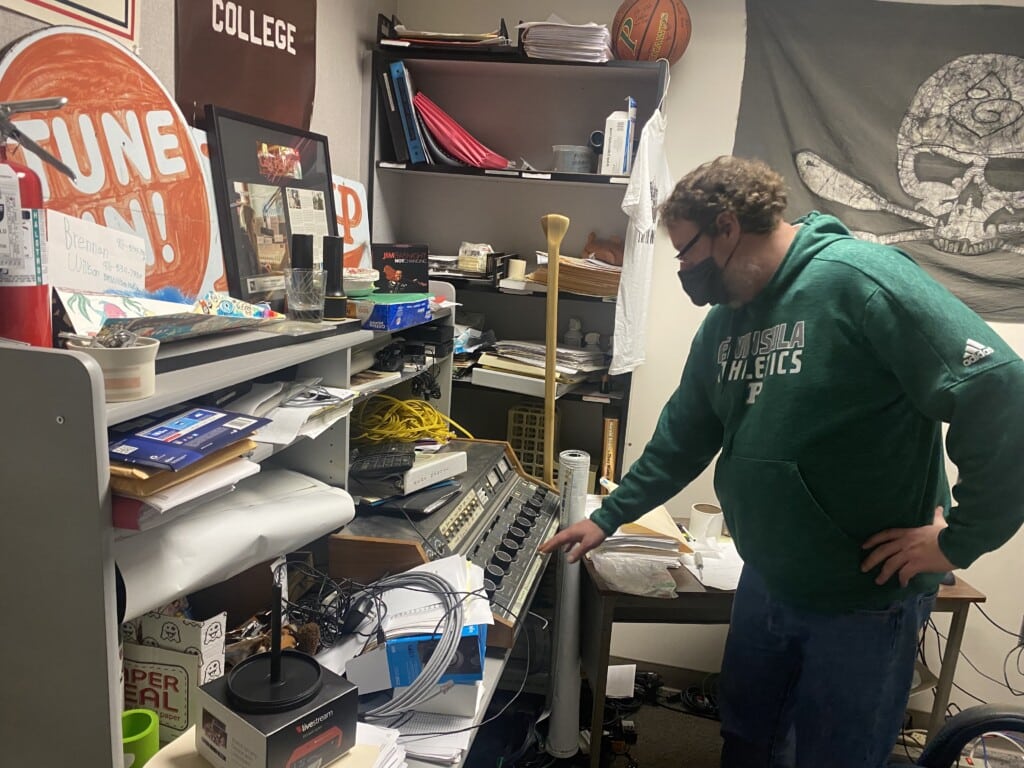
Spencer Abersold, station manager of KGHP-FM, looks over an obsolete broadcast console in his office on Thursday. The radio station is based at Peninsula High School in Gig Harbor and owned by Peninsula School District. Christina T Henry / Gig Harbor Now
Station manager Spencer Abersold, in his cluttered office adjacent to the studio, loads into the system an interview recorded earlier with a Gig Harbor athlete. Abersold’s office is piled with wires and equipment, and adorned with a batik wall hanging of a pirate skull. The hallways of the station are plastered in an eclectic array of posters — Glenn Miller, AC/DC, Johnny Cash — along with newspaper clippings and assorted other memorabilia.
Broadcaster Jon Grobins is over at Gig Harbor High setting up for live coverage of the Tides’ varsity boys basketball game against Yelm. The game will start as Devereux is signing off.
Just another day in the life of KGHP-FM.
Abersold is worried for the future of the radio station, however, given the suspension of broadcasting classes.
“I was very disappointed, and I feel that is a huge loss for our students,” he said.
Abersold is wary of a study the district has planned but temporarily shelved to assess the value of the station’s tangible assets. He thinks the study signals an intent to offload KGHP. District officials have confirmed to Gig Harbor Now that they will, when the study resumes, look at a range of possibilities from a dynamic reboot of the broadcasting program and the station, to making the program’s “twilight” permanent.
The assessment of assets will include a valuation of the broadcast licenses issued by the Federal Communications Commission should the district (hypothetically) consider selling KGHP, said Kris Hagel, executive director of digital learning.
Abersold thinks that would be a loss not only for students but for the Gig Harbor and Key Peninsula community.
How the district got a radio station
Back in the 1980s, a group of community members concerned about local emergency communications approached the school district about hosting a radio station that would broadcast to Gig Harbor and the Key Peninsula. Their names are recorded in large font on the station walls: Max Bice, Keith Stiles, Milt Boyd and Don Hoffman.
The station is classified by the FCC as a Low Power FM Noncommercial Educational Radio Broadcast Station, a name that refers to its not-for-profit, public radio status and its limited broadcast area. KGPH operates on three low-powered channels, 105.7 FM, 89.9 FM and 89.3 FM, covering a radius that encompasses the Key Peninsula, the wider Gig Harbor area and surrounding areas including parts of South Kitsap, Vashon Island and as far south as Joint Base Lewis-McChord.
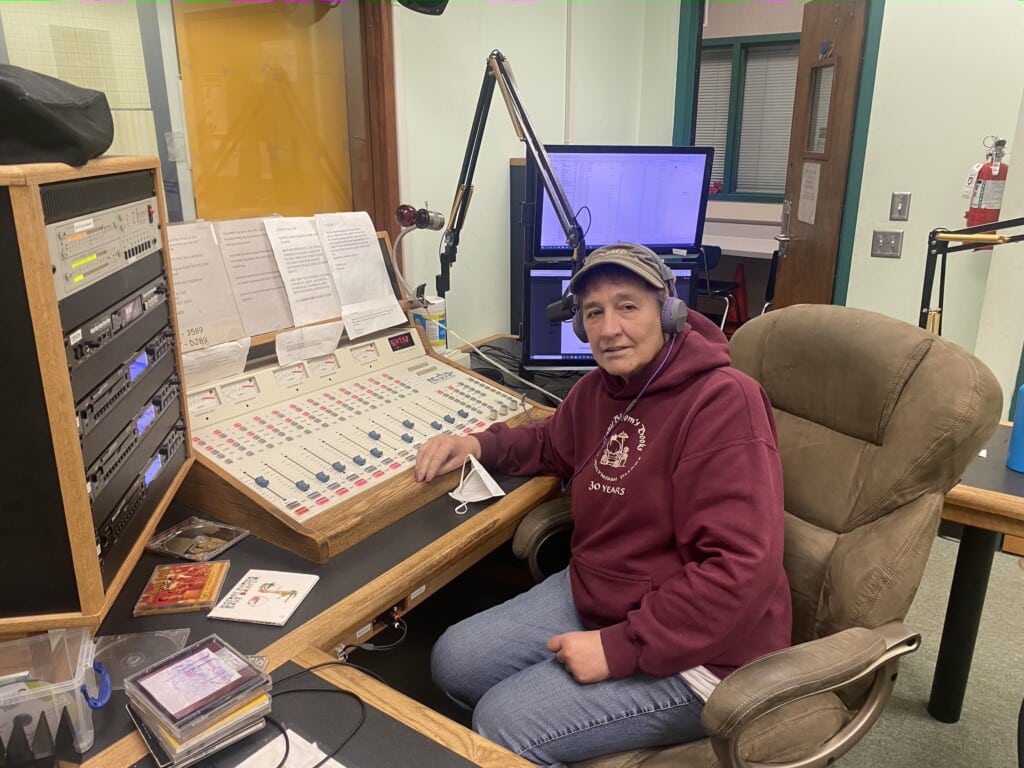
Betty Devereux, host of BD’s Books and Friends, takes a break from broadcasting her show at KGHP-FM on Thursday. Christina T Henry / Gig Harbor Now
In addition to live coverage of high school sports, the station has broadcasted parades, festivals, election results and other happenings about town. Weekly volunteer-hosted programs have been longstanding staples for listeners.
D.J. Dale, aka DJ the DeeJay, brings you “Classic Rock and Roll Connections”: rock playlists on a theme. Dave Allen plays “Mostly Jazz.” Mike Kelly, host of “Kelly’s Heroes,” has been bringing the sounds of reggae and ska to the harbor for nearly two decades. A program called “HarborChat” covers information on community events, nonprofit organizations and other topics of interest.
Abersold and the district have brought the station into the digital age, adding streaming via the district’s website at kghp.org.
“When I took over, we were only a terrestrial radio station. You wouldn’t have heard us if you were in say, New York or Europe,” Abersold said. “And now we have a worldwide audience.”
Abersold speculates many of the overseas listeners have military connections to nearby bases.
A decade ago, he would have estimated the online audience at 10,000 to 15,000. Now, with the saturation of the digital market, that number is closer to 6,000 to 8,000 at best.
Devereux, who struggled with dyslexia in her youth, has a background in the retail book industry. In the early 2000s, having moved to Gig Harbor, she heard a call out on KGHP for new hosts and thought, “I can do that.”
“I love books, and I love reading,” she said. “I’m hoping to inspire others to love books and to love reading.”
“A woman who reads books. I mean if that’s not public radio, I don’t know what is,” Abersold said.
Irreplaceable jewel or aging dinosaur?
Hagel said discussion of what to do with the radio station arose last spring, as Smith was getting ready to retire. Back in April 2021, then-interim Superintendent Art Jarvis suggested a study to evaluate KGHP from all angles.
“He really wanted to know what it would cost to make the radio station great,” Hagel said. “What is it worth if we decided that we needed to move on from having our own radio station?
“So, kind of two-fold, you know, to figure out if we want to invest the money into the radio station and try to revitalize our broadcasting programs, what would that look like? What would we spend money on, and also going the other direction, what is the value of the equipment that we have and the licenses that we have if we decide to go the other direction?”
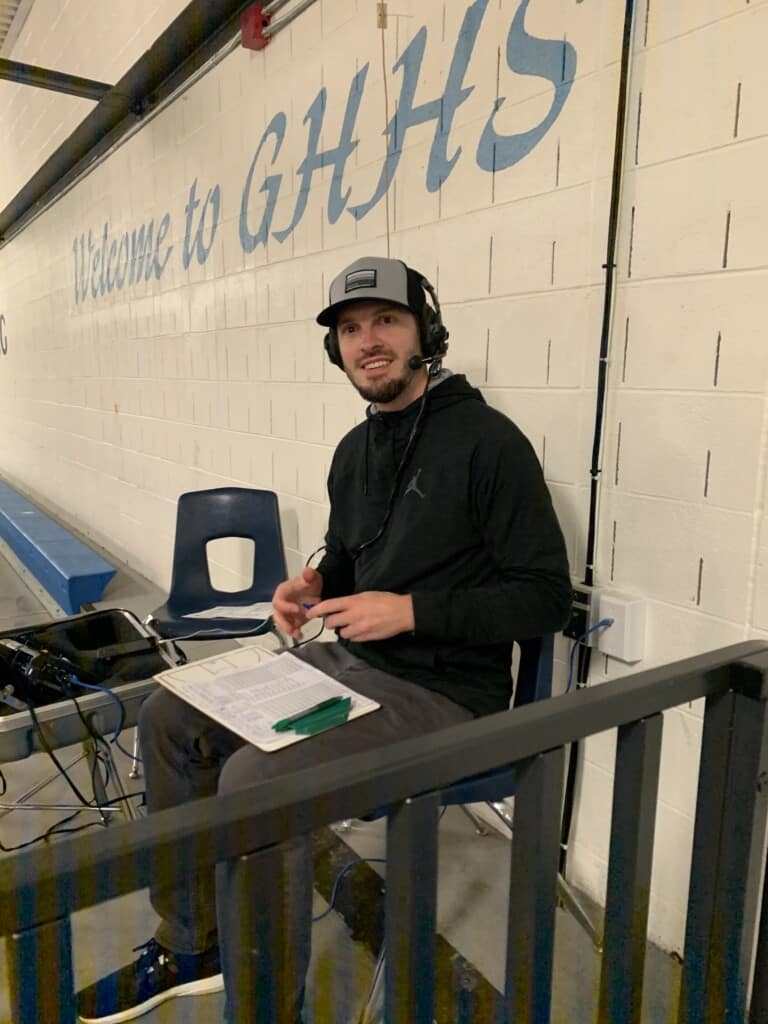
KGHP-FM sports announcer Jon Grobins prepares to broadcast a basketball game from Gig Harbor High School on Thursday. Dennis Browne/Gig Harbor Now
The study was put on hold as Jarvis (now with Bellevue School District) made way for incoming Superintendent Krestin Bahr.
Putting a value on the FCC licensing will be complicated.
“Radio licenses are not easy to come by. We own three of them. We’ve had them for years,” Hagel said. “The FCC only allows so many of them across the entire country. … I’ve always asked, ‘Why can’t we just take one of them and buy better?’ The FCC won’t allow you to do that. They limit the range your radio station could have.”
According to Hagel, who assumed his current role in 2015, his predecessor had been trying to sell one of the KGHP channel licenses to a nonprofit in Chehalis. Hagel thought the proposed sales price seemed low. So, he found a consulting firm in Portland for a second appraisal.
“And they actually told us that it was worth five times what they were going to sell it for. So, in the end we kept it,” Hagel said.
Hagel estimates the value of the FCC licensing in the “low five-figure range.”
If the license is sold to someone outside of Gig Harbor, replacing it will be neigh impossible. And, Abersold argues, the community will have lost an irreplaceable asset, including a lifeline in the event of an emergency, like a major earthquake, that disrupts internet communications.
“Yeah, in theory that’s true,” Hagel said. But the district a few years back reached out to local fire and emergency officials, he said, and “from what I’ve heard, that is no longer part of the emergency plan.”
And there are other issues. The signal from the station to the Key Peninsula tower at Evergreen Elementary is sent on wi-fi so it’s vulnerable in the event of a widespread cellular outage. In addition, the generator that would have been used to power the station in an emergency is not functioning. It would cost $8,000 to replace it, money Abersold says would be readily available from community donors but he hasn’t gotten the go-ahead.
With the move to digital streaming, why not just phase out the old equipment?
“I think that’s one of our big ponderings at the moment,” Hagel said. “When we look out across the landscape of media these days, it doesn’t seem like terrestrial FM radio is really a growing, stable industry. It seems to be declining.”
Assessing KGHP’s value to students
Enrollment in Peninsula School District’s broadcasting classes has declined over the past decade.
“There was a time where we would fill five periods a day with 30 kids. This was probably 10 years ago,” said Hagel, citing district records. “We ran the numbers this morning on the last five years. We were down to about to one section of broadcasting each of those five years with maybe one or two kids taking an advanced broadcasting class in the same period. And all of those enrollments are less than 30. So, what used to be 180 kids is down to, I think the final year was 21.”
Lack of student participation is one of the reasons the district’s radio broadcasting program was suspended, said Erin O’Neill, executive director of college, career and life readiness.
The decision to “twilight” the program was made with input from the district’s Career and Technical Education Advisory committee of district personnel and “industry partners” who advise on career trends. The CTE department is charged with creating or sustaining programming that leads to “high-wage, high-demand jobs,” O’Neill said. “But the bottom line in the next 10 years, the jobs for broadcasting — specifically radio broadcasting — are not even on the radar. There certainly is some growth happening in broadcasting technicians, and that’s not what we were offering.”
What former students say
Alex Benzegala was homeschooled but took electives at Peninsula High School starting his freshman year in 2006.
“I thought radio broadcasting sounded really cool. And so, I thought I’d try it out,” he said. “I broadcast the news my very first day of high school. So, that’s kind of where it all started for me, and I I’ve been hooked ever since.”
Broadcasting classes he took under Smith set him up for a fulfilling career in radio, said Benzegala, news and sports director at KHBT-FM 97.7 The Bolt, in Humboldt, Iowa. Over his years with KGHP, Benzegala hosted “The Benzi Morning Extravaganza” and helped Abersold with other programing.
“It gave me confidence, just as a person who stutters, I found out that I have a voice,” Benzegala said. “That’s the first thing it did is gave me confidence that I could pursue radio broadcasting as a career, and I just learned the ins and outs of broadcasting.”
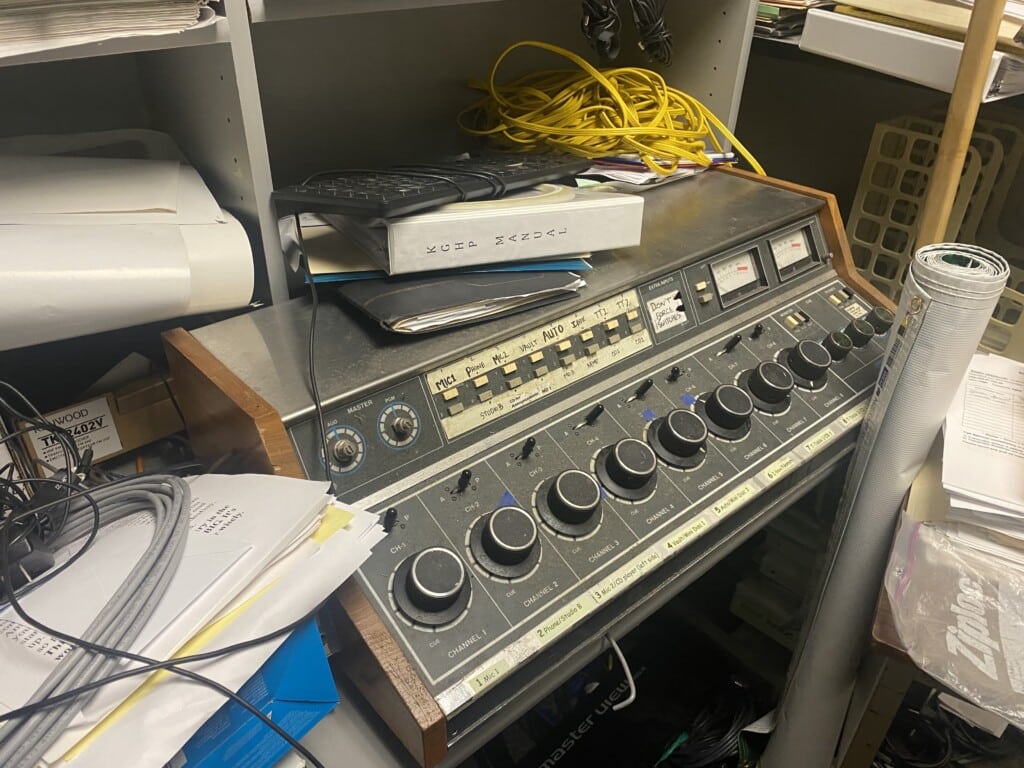
An obsolete broadcast console sits in the office of Spencer Abersold, station manager of KGHP-FM. Christina T Henry / Gig Harbor Now
Benzegala, who graduated high school in 2010, worked at his college radio station and held a string of other broadcast positions before landing his first paid job in 2017 in Fort Dodge Iowa. He started at KHBT in July.
Graysen Coyle, another Peninsula grad, hosted “The Midday Mosh” at KGHP as a junior and senior.
“It was really fun,” Coyle said. “I’m kind of convinced that no one but my mom listened to it because she would listen every week. I did rock music. I did metal, alternative, punk. You know that kind of edgy teenage music.”
Coyle, who graduated in 2018, is now a student at the University of Puget Sound, majoring in Japanese.
Although they don’t plan to pursue a career in broadcasting, they said their experience at KGHP imparted valuable skills that will apply in any field.
“Yeah, absolutely. I mean, communication is so important in pretty much every job, even jobs where you might not think so,” they said. “It also looks really good on a resume. I have to say, every single job interview that I’ve had since then, every single one of them has been, like, ‘What’s this thing about the radio show?’”
Abersold disagrees with the district’s assessment that jobs in radio aren’t there.
“We live in a media-driven society,” he said. “You have television, you have movies, you have internet with 10,000 different channels and cable networks with, you know, another 10,000 different models. And all of those need people to help them feed content 24 hours a day, seven days a week, 365 days a year for a worldwide audience that has massive range of eclectic value and interests.”
To O’Neill’s point about salaries for radio broadcast careers, the Bureau of Labor Statistics lists the median pay for radio announcers at $41,950, or $20.17 per hour. Onetonline.com gives broadcasting a “bright outlook,” meaning plentiful jobs, but lists the national median salary at $36,770. Indeed.com gives only a slightly rosier picture, listing broadcaster’s national average salary at $52,228 per year.
Benzegala’s current position pays $32,000 a year. But, he says, work’s not all about the money.
“Broadcasting really is a calling,” he said. “I mean, every day I wake up and I get to broadcast games and talk to the police chief and talk to the superintendent and tell stories …”
He was “extremely sad” to hear the district had discontinued the broadcasting program. “I owe my career to KGHP, so I’m disappointed that that class is no longer. But I know KGHP is still around and provides a great community resource,” he said.
The cost-benefit analysis
Running the radio station — now without students — comes at a cost to the district, finance records show.
Over the past two years, Peninsula schools received around $35,000 per year in sponsorships for KGHP, donations Abersold said he has worked hard to solicit. One of the district’s largest donors is Pierce County, which has given $25,000 a year since the 2020-21 school year. Other donors include Peninsula Light, Peninsula Metropolitan Parks District, the city of Gig Harbor, both local fire districts and a few local businesses.
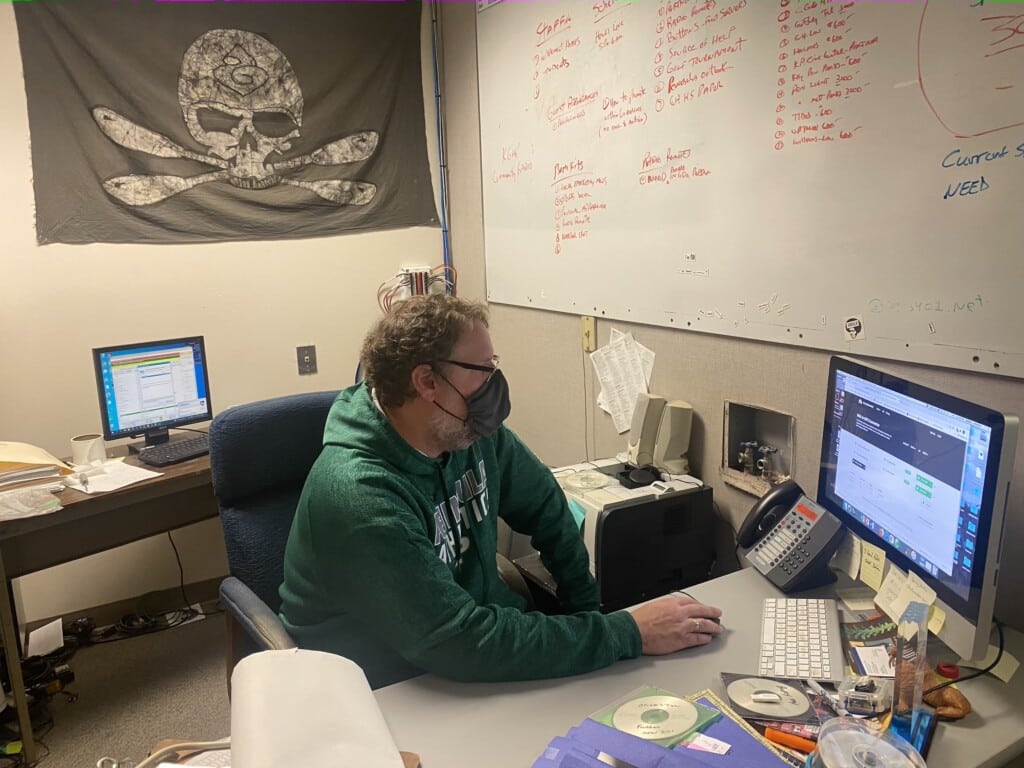
Spencer Abersold, station manager of KGHP-FM, works in his office on Thursday. Christina T Henry / Gig Harbor Now
The radio station’s operating budget covers Abersold’s salary and benefits, around $78,000 a year, plus general supplies, office and administration services, and other costs. Smith’s salary as a teacher was not considered part of the radio station’s budget.
Total operating costs run around $90,000 a year, so the district picks up around $55,000 per year to keep KGHP going.
“If you end your license, it’s nearly impossible to get back,” O’Neill said. “But that shouldn’t be in my opinion our only reason for hanging on. We should look at lots of things, including resources and how to align resources with our goals.”
O’Neill said the decision to end the radio broadcasting program was made conditionally, with a pledge to the CTE advisory group to evaluate for programming emerging media like podcasts that are proliferating in the digital streaming world.
With COVID-19 and so much more going on in the district, the big-picture analysis of KGHP’s role in education has been pushed to the back burner, along with the question of adding a rebooted digital media program of some sort.
“So, while I see we’re opening the door to looking at that pathway, we might decide not to do it at all,” O’Neill said. “Just like we don’t have a farm. Just like we don’t have other things because we can’t do it all.”

